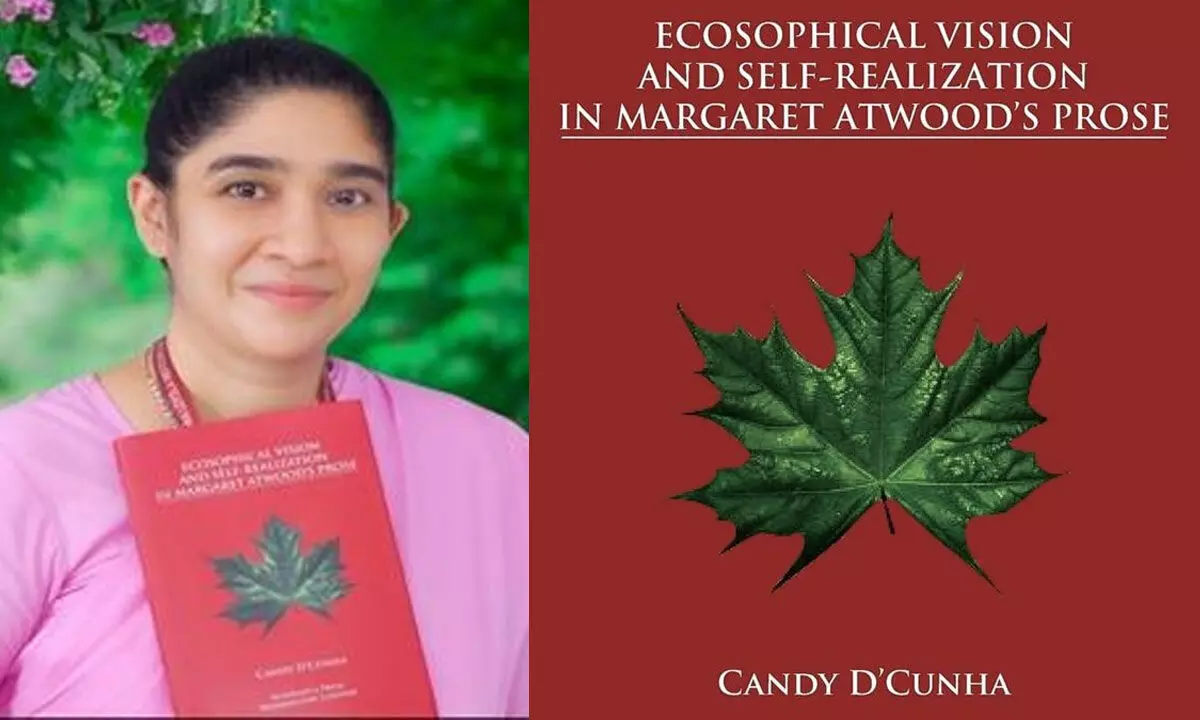Exploring eco-philosophy in Margaret Atwood’s prose

An interview with Candy D’Cunha
In a groundbreaking exploration of literature and environmental philosophy, Candy D’Cunha, an esteemed author, poet, and environmental activist, sheds light on her latest research endeavor in an exclusive interview. With her book “Ecosophy and Self-realization in Margaret Atwood’s Prose,” D’Cunha ventures into the realms of Eco-philosophy within Atwood’s literary universe, unraveling profound insights into humanity’s relationship with nature and the pathways to self-realization.
What sparked your interest in exploring Eco-philosophy within Margaret Atwood’s prose, leading to your pursuit of a D.Litt. degree extending the theme across global literature?
My doctoral studies at Krishna University laid the foundation for my research into Eco-philosophy within Margaret Atwood’s prose, focusing on the intricate connection between humanity and nature. This initial exploration served as a catalyst for my pursuit of a D.Litt. degree, where I expanded the scope to encompass Eco-philosophy across diverse literary landscapes worldwide.
Can you provide an overview of the concept of ecosophy and its significance in environmental philosophy?
Ecosophy, a term coined by Norwegian philosopher Arne Naess, embodies a holistic worldview that integrates ecological, social, and spiritual dimensions. It fosters a deep understanding of humanity’s interdependence with nature, advocating for sustainable coexistence and harmony. In environmental philosophy, ecosophy serves as a guiding principle, informing ethical frameworks and practical approaches towards ecological preservation and human well-being.
How do the philosophical themes in Margaret Atwood’s work intersect with Arne Naess’s principles of deep ecology?
Atwood’s narratives resonate with Naess’s concept of deep ecology, as both explore humanity’s intricate relationship with nature. Through her characters’ journeys, Atwood navigates ecological dilemmas, echoing Naess’s call for profound ecological awareness and interconnectedness. Her narratives serve as poignant reminders of our responsibility to preserve the environment for future generations, bridging literature with ecological philosophy.
How does Margaret Atwood incorporate themes of environmentalism and ecological concerns into her prose?
Atwood seamlessly integrates environmentalism into her prose through dystopian settings and characters grappling with ecological crises. Her vivid imagery and symbolic motifs serve as cautionary tales, urging readers to reconsider their role in preserving the environment. Through her narratives, Atwood prompts reflection on humanity’s interconnectedness with the natural world and the consequences of ecological exploitation.
In what ways do characters in Atwood’s novels navigate environmental challenges, and how does this contribute to their self-realization?
Atwood’s characters confront environmental challenges with resilience and adaptability, navigating harsh landscapes and human-induced crises. Through these trials, they undergo profound self-realization, gaining a deeper understanding of their interconnectedness with nature. Their journey of survival fosters introspection and growth, highlighting the transformative power of environmental experiences.
What philosophical or ethical questions does Atwood raise through her exploration of ecosophy and self-realization in her prose?
Atwood’s exploration of ecosophy and self-realization prompts philosophical inquiries into humanity’s ethical responsibilities towards the environment. She challenges readers to reflect on the moral implications of ecological exploitation and the interconnectedness of all life forms. Through her narratives, Atwood sparks conversations about environmental ethics and the imperative of ecological stewardship.
How might interpreting Margaret Atwood’s works from an Indian perspective contribute to ecological wisdom and environmental justice in Indian society?
Interpreting Atwood’s works from an Indian viewpoint enriches ecological discourse, fostering wisdom and ethics while promoting environmental justice. By integrating diverse perspectives, it cultivates a holistic understanding of environmental challenges, paving the way for sustainable solutions and equitable environmental practices in Indian society.








